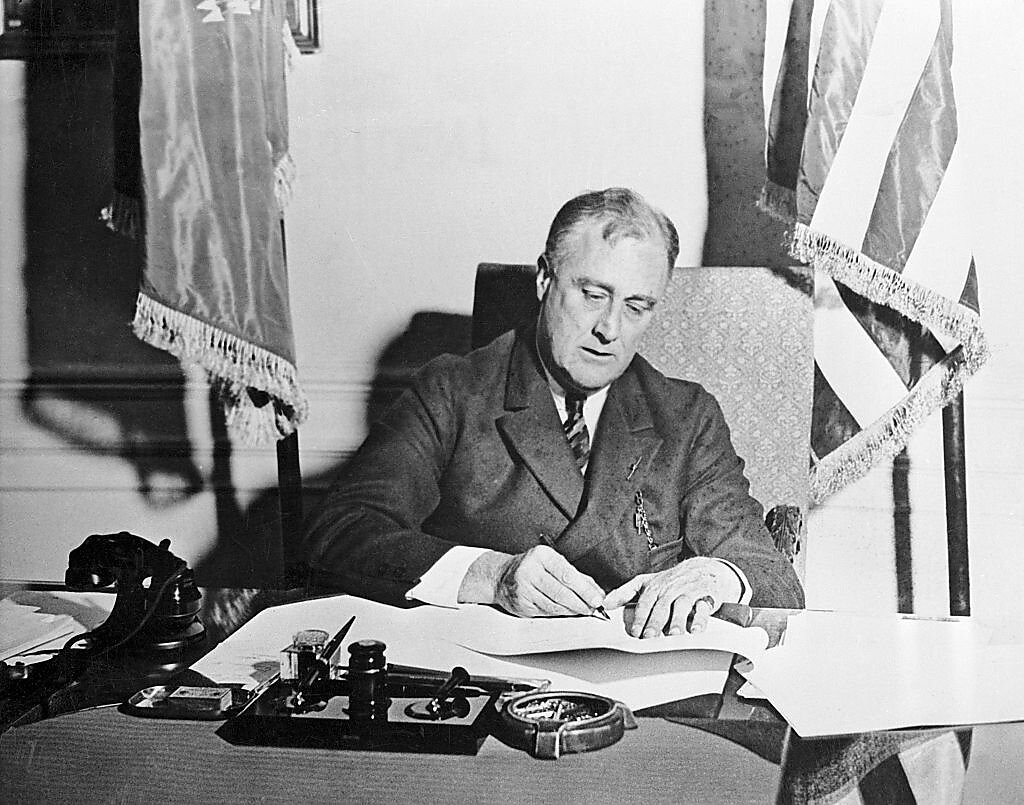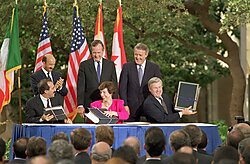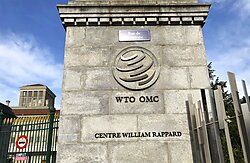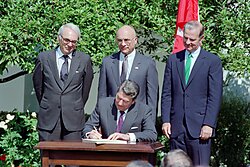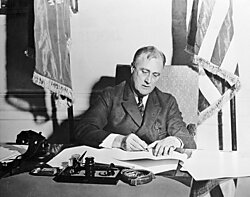-
Postwar trade liberalization has strong roots in the American progressive project.
-
The driving force for the rules-based trading system strongly aligns with US efforts to promote shared values for a peaceful world based on the rule of law.
-
Globalization has contributed to significant reductions in poverty while promoting shared prosperity at home and abroad—central components of the progressive policy agenda.
Introduction
Globalization has transformed the world. Centuries ago, it brought exotic spices and wares to distant corners of the globe. More recently, it has allowed us to work, see our families, and live our lives despite the disruptions caused by a once-in-a-lifetime pandemic. Trade in particular is a major component of globalization, which has lifted over a billion people out of poverty, made us more productive, and contributed to peace. Despite this, globalization and trade are under attack.
US Trade Representative Katherine Tai argued that the traditional approach to trade, focused on economic efficiency, has contributed to “a race to the bottom.” Meanwhile, President Biden has been beating the drum for his Made in America approach, even if it harms ties with our allies. Defending President Biden’s “Invest in America” agenda, Heather Boushey, member of the president’s Council of Economic Advisers, stated that “the global trading system has not always been fair, not always delivered the promised benefits to our citizens, [and] too often favored large corporate interests over workers’ interests.” The administration has thus called for a “new Washington consensus” but still has not answered the question posed by Jake Sullivan: “How does trade fit into our international economic policy, and what problems is it seeking to solve?”
What is striking about these statements is how far removed they are from traditional progressive views on trade and globalization, namely, that domestic and international prosperity are interlinked, that trade institutions support the rule of law, and that globalization is a tool for advancing well-being among the poorest. Trade has thus been peripheral to the Biden administration’s foreign economic policy. The shift in Washington toward favoring protectionist policies over trade openness is not only bad policy, but for progressives now calling for a new approach to trade, it also cuts against the very goals they are trying to achieve.
Tariff Liberalization as a Progressive Project
Economic turmoil and global conflict during the first half of the 20th century prompted a bold rethink of the international order. President Franklin Delano Roosevelt led the charge, overcoming fractured views on trade within his own party. The pragmatic and strategic vision of his secretary of state, Cordell Hull, helped him recognize the necessity of international economic cooperation to generate peace and prosperity at home and abroad. Roosevelt saw firsthand the devastating economic and social consequences of the Great Depression and acknowledged the role of trade barriers in deepening the crisis.
In a 1936 speech in Buenos Aires, Roosevelt criticized countries for their “attempts to be self-sufficient,” which “led to failing standards for their people and to ever-increasing loss of the democratic ideals in a mad race to pile armament on armament.” He called these policies “suicidal” and lamented that despite the suffering they caused, “many … people have come to believe with despair that the price of war seems less than the price of peace.”
The United States was no stranger to such policies. As post–World War I reconstruction was underway, European producers reemerged in the international market, fueling competition as they increased their exports. In the United States, amid a backdrop of economic uncertainty, many advocated for restrictive trade remedies that eventually culminated in the 1930 Smoot–Hawley Tariff Act, which led to an average tariff increase of 20 percent. Though originally intended to shield the agricultural sector from foreign competition through targeted tariffs, congressional logrolling greatly expanded the scope of the act to cover a broad range of products.
Unsurprisingly, its implementation sparked retaliatory measures from US trading partners, which included tariffs and quotas on products primarily imported from American producers, as well as widespread boycotts of American goods. While American exporters faced higher barriers to market access abroad, American consumers saw increases of between 4 and 6 percent in the relative price of imports, further reducing purchasing power and raising the cost of living. Though the tariffs did not bring about the Great Depression, economic historian Douglas Irwin notes that they contributed to both a “severe deterioration in trade relations in the early 1930s” and a global embrace of trade protectionism.
On the campaign trail in 1933, Roosevelt lambasted President Herbert Hoover and Republican leaders for the Smoot–Hawley tariff, saying that “President Hoover probably should have known that this tariff would raise havoc with any plans that he might have had to stimulate foreign markets,” and that the tariff was “the road to ruin, if we keep on it!” Retaliation from US trading partners was a major concern, making it difficult to sell products even to “logical customers, your neighbors across the border.” Roosevelt had another idea, which came from Hull, for “a tariff policy based on reason … a tariff policy based in large part upon the simple principle of profitable exchange, arrived at through negotiated tariff, with benefit to each Nation.” While Roosevelt was primarily concerned with economic stability in the United States, he was aware that this could not be achieved alone. In fact, he quickly recognized the symbiotic relationship between domestic recovery and the health of global trade.
The challenge, however, was that FDR lacked the authority to reduce trade barriers because the Constitution vests Congress with the power to regulate foreign commerce. Roosevelt and Hull thus jointly urged Congress to adopt the Reciprocal Trade Agreements Act of 1934 (RTAA), which, once passed, would empower the executive branch to negotiate tariff reduction agreements based on the principles of reciprocity and mutual benefit. Roosevelt explained that “by reducing our own tariff in conjunction with the reduction by other countries of their trade barriers, we create jobs, get more for our money, and improve the standard of living of every American consumer.” Furthermore, by increasing the authority granted to the executive branch, the RTAA reduced the impact of parochial interests in trade policy, since the president represented a national constituency.
Though many sensitive domestic industries retained trade protections, the RTAA marked a turning point in US trade policy. Not only did trade critics consider it to be fairly managed, it also found support among 71 percent of Americans. That did not mean its renewal did not face opposition in Congress, but as the United States entered the Second World War, sensible tariff policy became an instrument beyond domestic economic recovery and would serve as the foundation for a new international economic order guided by pragmatism, cooperation, and shared prosperity.
International Peace, Alliances, and the Rule of Law
Domestic economic recovery was not the only motivation for transforming the global economy defined by a liberalized trade regime. Rather, trade proponents strongly believed that deep economic integration would boost international peacebuilding and result in a freer, fairer world.
This idea is not new. In 1795, Immanuel Kant outlined how a constitution for civil law among nations could overcome the law of nature and create the conditions for perpetual peace. A key component of this was universal hospitality, which could make, among other things, “commerce with native inhabitants possible” so that “distant parts of the world can establish with one another peaceful relations that will eventually become matters of public law, and the human race can gradually be brought closer and closer to a cosmopolitan constitution.” The freedom to engage in commerce and avoid plunder was thus considered an important aspect of establishing a peaceful international community.
While the academic debate over the pacifying effects of international trade is ongoing, scholars agree that trade is an important variable that contributes to peace, though they place different weight on the explanatory power of liberal philosophy versus structural factors, such as liberal institutions, and the conditions under which the relationship is most salient. Reflecting on his own experiences, Hull described his personal realization of the idea that trade could lead to peace:
When the war came in 1914, I was very soon impressed with two points. The first was its terrific commercial impact on the United States. I saw that you could not separate the idea of commerce from the idea of war and peace.… And the second was that wars were often largely caused by economic rivalry conducted unfairly. I thereupon came to believe that if we could eliminate this bitter economic rivalry, if we could increase commercial exchanges among nations over lowered trade and tariff barriers and remove unnatural obstructions to trade, we would go a long way toward eliminating war itself.
Hull’s recounting provides further evidence for the argument that managing economic security concerns became a central issue for the architects of the postwar international order. One such way to address these concerns was through a framework of rules that would lower barriers to trade and provide for the peaceful settlement of disputes. The first step to achieve this was the General Agreement on Tariffs and Trade (GATT), which helped facilitate open trade relations based on the principles of reciprocity, nondiscrimination, transparency, and enforceability. At the launch of the GATT negotiations, Roosevelt made the case before Congress for why US participation was so important, noting that “the purpose of the whole effort is to eliminate economic warfare, to make practical international cooperation effective on as many fronts as possible, and so to lay the economic basis for the secure and peaceful world we all desire.”
By establishing a rules-based system, the GATT prioritized a predictable trade environment that would prevent the resurgence of the protectionist policies that worsened the economic instability and political conflicts of the first half of the 20th century. However, the GATT needed to be updated and expanded through successive rounds of negotiations that moved beyond simple tariff barriers. Another Democratic president was responsible for one of the most important rounds of GATT negotiations, which was eventually named after him—the Kennedy Round.
Prior to starting those talks, John F. Kennedy had secured authorization from Congress for additional tariff cuts up to 50 percent under the Trade Expansion Act of 1962. Upon signing the legislation, Kennedy remarked that “this act recognizes, fully and completely, that we cannot protect our economy by stagnating behind tariff walls, but that the best protection possible is a mutual lowering of tariff barriers among friendly nations so that all may benefit from a free flow of goods.” Kennedy argued that expanding trade would not only strengthen the US economic position but also bolster US alliances and, in doing so, help counter the threat posed by communism. He thus called the Trade Expansion Act “an important new weapon to advance the cause of freedom.”
International institutions were central to advancing these goals and supported a strong belief in the centrality of the rule of law and fairness that undergirds the progressivism movement. In a 1942 radio address, Hull explained why Americans should support US involvement in the war, stating that “liberty under law is an essential requirement of progress.” Liberty, to Hull, was “more than a matter of political rights.” In fact, he argued that the United States had “learned from bitter experience that to be truly free, men must have, as well, economic freedom and economic security.” Extending that internationally, Hull argued for “cooperative action under common agreement,” which “will enable each to increase the effectiveness of its own national effort.” Fifty-two years later, to mark the signing of the Uruguay Round Agreements Act that established the World Trade Organization (WTO), President Bill Clinton also made the case for “a fair and increasingly open world trading system that allows the free market to work and rewards the most productive people in the world,” as a means to “restore stability to the lives of the working people of our country.” Economic security at home, it was understood, required international institutions based on the principle of fair competition, which would facilitate access to economic opportunities.
An important way to assure fairness is to have a system of rules that applies equally to all and a means of recourse when those rules are violated. At the WTO, that has been the dispute settlement system, which allows countries to peacefully resolve trade disputes among themselves. What is truly amazing about this system is that even the smallest countries have access to it, and throughout most of the organization’s history, no country has seen itself as above the law.
A rules-based trading system was therefore always a precondition for economic interdependence that would be fair and accessible to all. Today, economic interdependence is still a core principle of liberal internationalism, though in Washington policy circles it has become less valued over time. Part of this stems from a loss of confidence in the rules-based order. President Biden’s national security adviser, Jake Sullivan, questioned “the premise that economic integration would make nations more responsible and open, and that the global order would be more peaceful and cooperative,” arguing that “Russia’s invasion of Ukraine underscored the risks of overdependence.” Tai shares this view, when in response to a question about how Russia’s invasion of Ukraine had upended the accepted wisdom of trade promoting peace, she said, “Peace is probably more necessary for prosperity than prosperity is for peace.”
Each of these arguments veers far from the progressive views toward trade and interdependence held by Roosevelt (whose portrait hangs above the fireplace in President Biden’s Oval Office), as well as other progressives. They also fail to understand the nuance in the trade-promotes-peace literature by arguing that the presence of any conflict disproves the theory that economic integration reduces the frequency and scope of conflict. Furthermore, as political scientist Daniel Drezner points out, complex interdependence made it difficult for Russia’s closest geopolitical ally, China, to provide strong public support for the war in Ukraine. In fact, he argues that China’s links to the global economy and Western countries in particular curbed its behavior by tipping the cost–benefit analysis to favor adopting a less prominent role in the war. The Russia–Ukraine war thus reveals that while interdependence does not eliminate all security concerns, the liberal international order still effectively constrains aggressive foreign policy behavior and fosters collective responses. This is precisely why, in his famous address at American University in 1963, Kennedy remarked that “even the most hostile nations can be relied upon to accept and keep those treaty obligations, and only those treaty obligations, which are in their own interests.” A material interest in accessing markets can thus moderate a country’s behavior.
The loss of faith in the power of interdependence as a restraint and the benefits of a system based on rules appears to be the new consensus in Washington, perhaps best executed by former president Donald Trump. Under his administration, the United States launched a series of trade wars that not only resulted in significant economic harm at home and retaliation that soured relations with our closest trading partners but also undermined the rules-based trading system. Though President Biden has made important strides in improving relations with our allies, on trade, he has largely preserved, and defended, some of Trump’s most controversial policy actions.
For example, when the metals tariffs that were applied for alleged national security concerns were found to violate international trade rules, Adam Hodge, who was then a spokesperson for the US Trade Representative, denounced the ruling, saying that “the United States strongly rejects the flawed interpretation” of the rules and that “issues of national security cannot be reviewed in WTO dispute settlement.” To make the US objection clear, he went on to say, “We do not intend to remove the Section 232 duties as a result of these disputes.” What is interesting about the Biden administration’s position is that in saying its actions are above the law, the United States has now established a slippery slope whereby other countries can claim national security interests as cover for trade protectionism.
The US approach to trade has shifted far from its progressive roots in another important way as well. The spirit of cooperation and need for predictability that underscored the postwar institution-building efforts are also under threat, not just with adversaries but with allies too. Discussing the sunset review of the United States-Canada-Mexico Agreement, Tai stated that “the whole point” of the negotiations “is to maintain a certain level of discomfort, which may involve a certain level of uncertainty.” During the Trump administration, uncertainty was a driving strategy of trade policy.
The problem with uncertainty, however, is that it breeds confusion, economic disruption, loss of trust, and hesitancy over making commitments. This is the direct opposite of what motivated the architects of the modern international trading system and its most steadfast champion, the United States. The last expression of those progressive ideals was shared by former US Trade Representative Michael Froman in his exit memo, where he wrote: “Through our trade policy, we bolster our partners and allies, lead efforts to write the rules of the road for fair trade among partners, and promote broad-based development. Trade done right is essential for our economy here at home and for America’s position in the world.” In contrast, US policymakers today have increasingly embraced a more zero-sum logic and thus failed to appreciate the importance of leading by example on trade and other foreign economic policies.
Tackling Poverty and Promoting Shared Prosperity
Though many advocates of trade protectionism today often point to levels of global inequality, stalled development, and middle-class stagnation as justifications for de-globalization, the evidence paints a more positive picture of globalization. In fact, looking at indicators such as life expectancy, infant mortality, literacy, and living standards, the story of the era of globalization is one of considerable progress and declining inequality.
From 1990 to 2019, the share of the global population living below the poverty line—set at $2.15 per day based on 2017 prices—decreased from 38.01 percent to 8.98 percent (Figure 1). Economist Kimberly Clausing explains that within China alone, “the share of the population living in poverty fell from 88 percent of the population to 2 percent of the population between 1980 and 2012,” suggesting that a billion people were lifted out of extreme poverty due to China’s economic opening. The negative correlation between trade openness and poverty levels is difficult to dispute, especially considering that regions with the most stagnant economic growth are those that maintain high tariff barriers and have therefore seen slow trade growth, such as sub-Saharan Africa. In addition to reducing poverty, expanded trade led to increased gross domestic product (GDP) growth. Economists Gary Hufbauer and Megan Hogan estimate that without post–World War II trade liberalization, US GDP would have been $2.6 trillion lower in 2022, at $22.9 trillion instead of $25.5 trillion, averaging to welfare gains of $19,500 per household in 2022. These gains from trade have broadly benefited consumers and reduced inequality. The Cato Institute’s Chelsea Follett explains that this time period has also witnessed considerable progress toward raising living standards worldwide (Figure 2).
While small changes to tariff rates may appear inconsequential, the WTO estimates that universal withdrawals from free trade agreements and increases in most-favored-nation tariff rates would decrease real income by 0.3 percent and 0.8 percent within three years, respectively. The 6 percent increase in food prices in the United Kingdom following Brexit offers a potent example of this effect, when the cost of living increased 50 percent more for low-income households compared to high-income households. Critically, these costs were not evenly distributed, as lower-income households spend a higher portion of their income on imported items than high-income households.
Worsening this disproportionate effect is the fact that trade barriers raise the cost of goods and services and reduce the choices available to consumers. Recently, the 2024 Economic Report to the President highlighted that US imports from China were “accompanied by a substantial fall in US consumer prices, with disproportionate benefits accruing to low- and middle-income households because they have higher shares of tradable goods like food and apparel in their consumption baskets.” In the United States, it’s particularly striking that cheaper consumer goods typically maintain higher tariff rates than equivalent luxury products (Table 1).
Ed Gresser, vice president and director for trade and global markets at the Progressive Policy Institute, identified this trend across the US tariff schedule and found, for example, that the tariff rate placed on steel spoons is five times higher than the rate placed on silver spoons. Similarly, while a cashmere sweater has a 4 percent tariff rate, wool sweaters have a 17 percent rate, and acrylic sweaters have a 32 percent tariff rate. This makes the US tariff schedule a regressive tax whereby low-income households are not only spending a higher portion of their income on imported items, but they are also paying a higher average tariff rate on those purchased goods. A growth in protectionist measures would exacerbate these inequities.
However, since the gains from trade are often diffused throughout the economy, they can often go unnoticed and are given less attention than trade costs, which are often concentrated. As a case in point, the “China Shock” serves as a common talking point for critics of globalization, even though the findings of the famous study that coined the term have been strongly contested.
In placing so much emphasis on concentrated and marginal direct employment losses, globalization’s critics also fail to see the widespread economic benefits of trade through greater competition with foreign producers, which results in lower prices for consumers and limits domestic firms’ ability to pursue monopolies, as Clausing explains in her book, Open: The Progressive Case for Free Trade, Immigration, and Global Capital. On the other hand, Clausing also calculates that “protectionist measures cost consumers as a group, on average, over $500,000 per job saved” through added taxes caused by higher tariffs. In some industries this cost is more extreme; according to economist Anne Krueger, “it is estimated that the annual cost of one job ‘saved’ in the steel industry is about $900,000.” These unemployment-based evaluations also ignore that lower tariff rates reduce the costs of intermediate goods for domestic manufacturers, which in turn leads to greater production capacity and hiring ability. Final made-in-America products are thus cheaper because of these foreign intermediate inputs, increasing their market competitiveness.
Clausing thus analogizes the trade shock to technology shocks: While advances in technology can reduce the demand for some jobs, they simultaneously increase productivity and efficiency, create many new job opportunities, and benefit everyday users. It would be unusual to come across someone who would argue that the internet should not have been broadly adopted for the sake of conserving a small portion of jobs. This is not to suggest that these shocks are not serious policy concerns; rather, it is intended to demonstrate that imposing protectionist measures to save jobs will fail to achieve the desired effect and instead will reduce economic growth and impose widespread costs. Broadly speaking, these negative externalities should be remedied through more robust public policy instead of trade restrictions to assist Americans in adjusting to economic disruptions.
As one of the report’s authors, Gordon Hanson, later remarked in Foreign Affairs, though the China Shock “hurt many US workers and their communities … so, too, have automation, the Great Recession, and the COVID-19 pandemic. And because the scarring effects of job losses are the same whether imports, robots, or a virus is responsible, responses to the damage should not depend on the identity of the culprit.” He therefore argued that protectionist measures “will do little to help workers who are already hurting or to help others avoid a similar fate” and that instead, the president “should establish targeted domestic programs that protect workers from the downsides of globalization.”
Though trade generally acts as a positive force, challenges persist. The economic disruptions and global health crisis caused by the COVID-19 pandemic drove many countries, including the United States, to grow wary of globalization, leaning away from international trade cooperation in favor of a more protectionist and at times fragmented system. However, the presumption that the optimal solution to these global challenges lies solely in unilateral or regional action is flawed. As WTO director-general Ngozi Okonjo-Iweala noted in the World Trade Report 2023, “a retreat from economic integration would roll back recent development gains, make it harder for countries to grow their way out of poverty, and harm future economic prospects for the poorest people the most.” In other words, fragmentation would only exacerbate existing challenges.
The World Trade Report instead advocated for addressing the world’s most pressing challenges through greater global openness, integration, and cooperation, contingent on the reform of the international trading system. This approach, termed “re-globalization,” aims to integrate more economies into the global trading system and to promote a more equitable, transparent, and reliable trading framework. As President Barack Obama once stated, “globalization is a fact,” and while the United States can’t “build a wall” around globalization, he said, “what we can do is to shape how that process of global integration proceeds so that it’s increasing opportunity for ordinary people.”
The United States has long shaped that process. In fact, it was American leadership in the global economy that established the WTO, which President Clinton described as “a victory for a couple of simple ideas.” Essentially, “the idea that America can lead in the 21st century, that we need not fear competition, that we want our neighbors to do better than they have been doing, and when they do better, we will do better.” Though the belief that a rising tide can lift all boats is no longer in vogue in Washington, it has been a driving force for US engagement in the world economy and has contributed to a healthier, wealthier, and more stable world.
Conclusion
US leadership in the global economy is needed now more than ever, yet there is no need to rethink the entire trading system. The blueprint is well known, and as this essay shows, the driving force behind the modern trading system is deeply rooted in American values. Many progressives have called this system unfair. No institution is perfect, and it is true that the WTO and US trade agreements as we have known them would benefit from reform. However, their critics have lost sight of the very real benefits globalization and trade have provided and have also forgotten the progressive ideas that helped shape the international trading system after the Second World War. That system has not only reduced poverty but has also promoted shared prosperity, at home and abroad. Progressives would do well to remember these achievements and their important part in securing them.

This work is licensed under a Creative Commons Attribution-NonCommercial-ShareAlike 4.0 International License.
